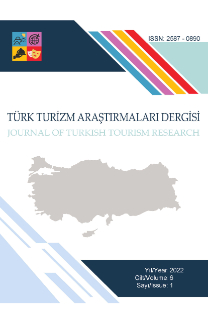Sosyal Turizme Yeni bir Bakış: Türkiye’nin Alternatif Kamp İncelemesi
Sosyal turizm, Avrupa ülkelerinde genellikle dezavantajlı bireylerin sosyal yaşama katılımını arttırmak ve eşit bir toplumsal yapı oluşturmak amacı ile uygulanan bir turizm stratejisidir. Türkiye’de ise sosyal turizm uygulamaları ve akademik alana yansımaları oldukça kısıtlı olmakla birlikte genellikle bu uygulamalar belediyelerin imaj çalışmaları için yapılmaktadır. Buna rağmen, Antalya’da bulunan Türkiye’nin Alternatif Kamp uygulaması Avrupa Sosyal Turizm uygulamalarına örnek bir modeldir. Bu araştırmanın amacı, örnek vaka olarak ‘Alternatif Kampı’ inceleyerek ülkemizde uygulanan sosyal turizme yeni bakış açısı getirmektir. Araştırma etnografik alan araştırması yöntemi kullanılarak tamamlanmıştır. Araştırma verileri katılımcı gözlem metodu, yarı yapılandırılmış yüz yüze görüşmeler ve ikincil belgeler ile toplanmıştır. Araştırma bulgularına göre (1) erişilebilirlik, (2) çeşitlilik, (3) bütünlük kapsayıcı bir sosyal turizm uygulamasının 3 temel bileşenidir. Araştırma sonucunda sosyal turizm kavramına yeni birtanım önerisi getirilmiştir.
A New Perspective to Social Tourism: Examining the Turkey’s Alternative Camp
Social tourism is a tourism strategy practicing in European countries generally to increase the social integration of disadvantaged people and to create an equal social structure. In Turkey, the practices and academic researches about social tourism is lack and the existed ones are generally for municipality reputation performances. Despite this, the ‘Alternative Camp’ practice of Turkey which is in Antalya, is an example case to European social tourism models. This research aims to bring a new perspective to social tourism practices in Turkey by investigating the case of Alternative Camp. The research has been completed by using ethnographic case research methods. To gather data, face to face semi structured interviews, participatory research methods and secondary data has been used. According to research findings there are three components for an inclusive social tourism practice as; (1) accessibility, (2) diversity, (3) integrity. As a result, a new definition for social tourism has been proposed.
___
- Almedia, M. (2011). The development of social tourism in Brazil. Current Issues in Tourism, 14(5), 483-489.
- AYDER. (2014). Kapsayıcı piyasa iş modeli olarak Alternatif Yaşam Derneği; AYDER ve Düşler Akademisi. duslerakademisi-kas.org/wp-content/uploads/2014/09/AYDER- dusler-akademisi.doc
- Baumgartner, C. (2013). Social tourism and sustainability. In L. Minnaert, R. Maitland, & G. Miller, Social tourism; Perspectives and potential, (pp. 166- 176). New York: Routledge.
- Belanger, C. and Jolin, L. (2011). The International Organisation of Social Tourism (ISTO) working towards a right to holidays and tourism for all. Current Issues in Tourism, 4(5), 475-482.
- Brewer, D. J. (2000). Ethnography. Buckingham: Open University Press.
- Demirkol, Ş. (1988). Sosyal Turizm ve Türk Turizmindeki Yeri (Yüksek Lisans Tezi), İstanbul Üniversitesi, Sosyal Bilimler Enstitüsü, İstanbul, Türkiye.
- Dumitru, N., Negricea, C. and Slapac, A. (2009). Social Tourism; a factor in cultural, social and economic change. Romanian Economic and Business Review, 4(2), 89-94.
- Golafshani, N. (2003). Understanding Reliability and Validity in Qualitative Research. The Qualitative Report, 8(4), 597-606.
- Haulot, A. (1983). International Bureau of Social Tourism. Annals of Tourism Research, 10(4), 558- 560.
- Higgins-Desbiolles, F. (2006). More than an ‘‘industry’’: The forgotten power of tourism as a social force. Tourism Management, 27(6), 1192–1208.
- Hunziker, W. (1951). Social tourism: Its nature and problems. Geneva: International Tourists Alliance Scientific Commission.
- ISTO. (2016). Montreal Declaration; Towards a humanist, social vision of tourism.
- http://www.oits- isto.org/oits/public/section.jsf?id=44
- Kızılırmak, İ. ve Ertuğrul, M. S. (2012). Sosyal turizmin gelişiminde yerel yönetimlerin rolü ve yapılan uygulamalar. Manas Journal of Social Studies, 1(2), 34-53.
- McCabe, S. (2015). Is the UK being left behind? Current trends in social tourism in Europe and beyond, commissioned by Family Holiday Association. UK: Laurance Paper Co.
- Minnaert, L., Diekmann, A. and McCabe, S. (2012). Defining social tourism and its historical context. In L. Minnaert, A. Diekmann, and S. McCabe, Social tourism in Europe; Theory and practice (pp. 18-30). Bristol, UK: Channel View Publications.
- Minnaert, L., Maitland, R. and Miller, G. (2007). Social tourism and its ethical foundations. Tourism, Culture & Communication, 7(1), 7-17.
- Özgökçeler, S. ve Bıçkı, D. (2013). Bir turizm hakkı olarak sosyal turizm ve engelliler. Yeni Toplumsal Yapılanmalar: Geçişler, Kesişmeler, Sapmalar, Bildiri Kitabı 3: 7. Ulusal Sosyoloji Kongresi (549-565). Muğla, Turkey: Sıtkı Koçman Üniversitesi.
- Queensland Government. (2017). Inclusive Tourism Making your business more accessible and inclusive, Advancing Tourism Report 2016-20.
- Rains, S. (2009, October 11). What is inclusive tourism. https://www.slideshare.net/srains/what-is-inclusive-tourism-by-scottrains?qid=a4aad01b-4eee-4232- 97ba7ded354d3808&v=&b=&from_search=10
- Safrit, D. and Schmiesing, R. (2012). Volunteer models and management, chapter 1, p. 3-31, In; Connors, T. (Eds.), The Volunteer Management Handbook: Leadership strategies for success (2nd ed.), (3-31). New Jersey: John Wily & Sons, Inc.
- Sarıbaş, Ö. and Akbaba, A. (2018). A general overview of social tourism literature. Paper presented at the 3rd International Eastern Mediterranean Tourism Symposium Iskenderun, Turkey. https://www.researchgate.net/publication/324706453_A_General_Overview_of_Social_Tourism _Literature_in_Turkey_A_Bibliometric_Study_on_Social _Tourism_Researches
- Scheyvens, R. and Biddulph, R. R. (2018). Inclusive tourism development. Tourism Geographies, 20(4), 1-22.
- Soler, J., Diaz, M. and Vera, P. (2018). The Accessible Social Tourism: A new tourist model. Cuadernos de Turismo, 41, 139-155.
- United Nations. (2015). Sustainable development goals knowledge platform. Transforming our world: The 2030 agenda for sustainable development. https://sustainabledevelopment.un.org/post2015/transformingourworld
- UNWTO. (1999). Global code of ethics for tourism.
- http://www.unep.org/bpsp/Tourism/WTO%20Code%20of%20Conduct.pdf.
- Uğurlu, K. ve Ar, H. (2014). Engelli bireylerin ve ailelerin sorunlarının tespit edilememesinin sosyal turizm projelerine engel teşkil etmesi: Kırklareli ili örneği presented at the 15th National Tourism Conference 2014, Ankara, Turkey
- Usta, Ö. (1982). Sosyal turizm. İzmir: İstiklal Matbaası
- Yılmaz, Y. (1984). Sosyal turizm ve Türkiye (Yüksek Lisans Tezi). Hacettepe Üniversitesi, Sosyal Bilimler Enstitüsü, Ankara, Türkiye.
- ISSN: 2587-0890
- Yayın Aralığı: Yılda 4 Sayı
- Başlangıç: 2017
- Yayıncı: Prof. Dr. Yüksel ÖZTÜRK
Sayıdaki Diğer Makaleler
Otel İşletmelerinde Paydaş Odaklılığın İşletme Performansı Üzerine Etkisi
Funda UĞRAÇ, Arif Emre ERDEN, Fatih Kürşat NEGÜZEL, Özgür KIZILDEMİR
Gelenekselden Dijitale Turizm Sektörü
Yiyecek İçecek İşletmelerinde Şikâyet Yönetimi Uygulamaları: Sakarya Örneği
Çalışanların Kişilik Özelliklerinin Değişime Açıklığa Etkisi: Eskişehir Restoranları Örneği
Sezer YERSÜREN, Ebru ZENCİR ÇİFTÇİ
Safranbolu’da Dericiliğin Günümüzde Kalıntısı: Tabakhane Müzesi
Sosyal Turizme Yeni bir Bakış: Türkiye’nin Alternatif Kamp İncelemesi
